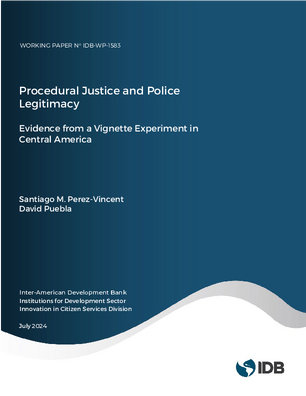Procedural Justice and Police Legitimacy: Evidence from a Vignette Experiment in Central America
Date issued
Jul 2024
Subject
Crime Prevention;
Justice Administration;
Police Officer;
Criminal Justice;
Police Force;
Police Service;
Police Corruption;
Crime and Violence;
Trust;
Income Distribution
JEL code
K20 - Regulation and Business Law: General;
H11 - Structure, Scope, and Performance of Government
Country
Honduras
Category
Working Papers
This paper examines the impact of procedural justice and sanctions on police legitimacy in a middle-income context using a between-subjects vignette experiment among civilians and police officers in Honduras. The scenarios involved civilian--police interactions following a minor infraction, varying in whether the police officer treated the civilian respectfully or disrespectfully, and whether a sanction (fine) was imposed. Respectful treatment increased satisfaction, acceptance of decisions, and willingness to cooperate, while sanctions had the opposite effects on these variables. Sanctions lowered the perceived likelihood of repeating the infraction, whereas respectful treatment had no effect on it. Results were similar for civilians and police officers, though officers assigned greater importance to procedural justice. The study concludes that, while sanctions deter repeated infractions, they can erode legitimacy if not applied respectfully, highlighting the importance of procedural justice in civilian--police interactions. The positive impact of procedural justice among both civilians and officers perceptions supports the desirability and feasibility of its application in this context.
Generative AI enabled




